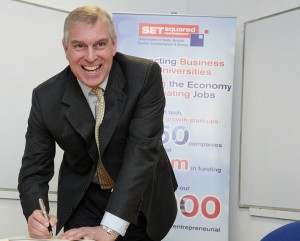Foreign ownership of British companies does not matter if they continue to invest in research, development and manufacturing in the UK, the Duke of York said during an official visit to Bristol this week.
Speaking exclusively to Bristol Business News, he said many former British businesses had successfully been bought by overseas firms without it damaging them or the UK economy.
He also said UK manufacturing could still be a world beater if investment in skills, innovation and technology was maintained,
And calling on the spirit of Brunel to inspire the next generation of innovators, the Duke said it was vital that the talents of young people were recognised without pressure on them to go to university.
“I’m less worried about what the ownership is so long as the research and people remain in the UK,” the Duke said.
“There are a number of businesses that have been bought by international businesses, particularly here in the South West, which have not moved anybody but retained their personnel, research and development and manufacturing in this part of the world.
“So I’m less worried about ownership. It’s more about where the research is done. We have got some of the world’s leading research universities here and we are the best place in the world to do science and engineering. We should be encouraging young people to follow careers in these areas.”
The Duke was speaking shortly after he toured Bristol University’s SETsquared centre, which helps develop small hi-tech businesses. Earlier in the day he had met young people at Brunel’s SS Great Britain, of which he is patron.
He said the pioneering attitude of Brunel was vital to meet today’s challenges. Engineering should be a profession that young people aspire to “rather than one people look down their noses at,” he said.
Young people did not need to think they had to go to university to gain the right skills, he added. Instead, they should be encouraged to use the skills they already have.
Brunel provided the perfect inspiration for a new generation of scientists, engineers, innovators and entrepreneurs, he added, pointing out the interesting parallel that, beside the restored SS Great Britain is the Bloodhound project, which is creating the world’s fastest car.
“If Brunel were alive today, would he be more interested in the conservation of the Great Britain or in a superfast car capable of 1,000mph?” said the Duke
“I would like to think he would be fascinated by both – in the fact that one of his inventions is being preserved and that its technology is still being used today, such as its propeller traction. But I think he would also have been fascinated by the thought of a car going that fast.
“After all, at the time the Great Britain was the fastest way to travel at sea. It was pioneering. It was the largest vessel on the sea and it was years ahead of its time. In some ways it was the Concorde of its day, a whole new method of mass transit.”
Praising entrepreneurs of the type he met at SETsquared, the Duke said it was important they were encouraged to pass on their knowledge to the next generation and also support them financially.
“Entrepreneurs are going to come to a point where they are going to have to sell their businesses,” he said. “One idea is for these entrepreneurs to put money into the next generation. In that way you get a virtuous circle.”
He said Britain could maintain its advantage over low-cost economies by constant innovation and because developing industrialised nations themselves lose their competitive edge when they become more advanced.
The visit to SETsquared reinforced the city’s position as a world leader in the microelectronics industry. Bristol has long been a centre for microchip design which in turn has spawned successful IT and telecoms industries in the region.
His Royal Highness met five of the businesses supported by SETsquared, which has helped start-up businesses gain the support and funding they need to become a global player. create a “virtuous circle” through which entrepreneurs could build businesses, sell them, then use some of the proceeds to re-invest in fledgling companies.
The businesses voiced their concern over the funding gap for new and growing firms – an issue the Duke sympathised.
Since 2008 SETsquared has attracted £56m of investment for the ventures at the centre in addition to providing serviced office space, a business support community and on-site technology entrepreneurs.
The Duke’s role supporting the Queen as Head of State centres on trade and investment. He also focuses his attention on helping businesses to create prosperity in the UK, enhancing social entrepreneurial activity and helping young people to develop skills for the future.
SETsquared director Nick Sturge said: “The Duke of York had heard about the work SETsquared is doing to support entrepreneurs in hi-tech businesses and was keen to find out more. He clearly understood the challenges faced by businesses at the leading edge of technology and was keen to know what more can be done to take these businesses to the next stage of their development.
“There’s a strong undercurrent of feeling at the moment that the world is becoming more aware of Bristol as a technology hub and we feel that the Duke’s visit further supported this.
“We now support more than 55 companies and have a zero rate of failure, proving that SETsquared has played a significant role in growing the technology cluster in Bristol, specifically in microelectronics.”
During his visit to SETsquared the Duke met Hybrid Logic, which has created software that makes web servers work co-operatively so that if one of them fails another one immediately takes over; Test & Verification Solutions Ltd (TVS) which focuses on software testing, hardware verification and outsourcing for various types of companies; DocCom, which uses enterprise social network technology to help health organisations and their workers communicate easily and more effectively; Gnodal, which has built the largest, fastest, most-efficient networks for high performance data centres; and XMOS, which was co-founded by professor David May and whose revolutionary processors offer the fastest route from idea to product, dramatically reducing costs and time to market.






























